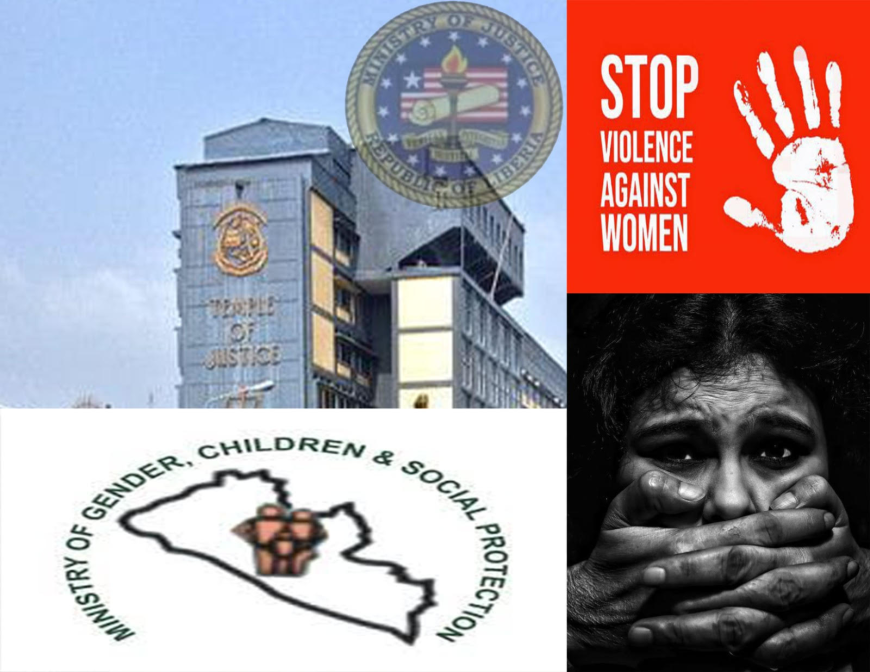Appeal for Stronger Action, Support for Survivors as Sexual Gender-Based Violence Swells

Liberia is no exception, as domestic violence, rape, child abuse, and cyberbullying continue to rise, depicting deep-seated cultural, legal, and systemic challenges. Despite ongoing efforts to combat the crisis, recent statistics paint a grim picture.
The Ministry of Gender, Children, and Social Protection (MoGCSP) reported a staggering 2,759 rape cases between January and October 2024, with Montserrado County accounting for 1,902 cases, amounting to a percentage of 68.7, highlighting the urgent need for stronger policies, robust community engagement, and survivor-centered interventions.
As the crisis escalates, gender advocates and government officials are raising their voices and calling for urgent action. Among them is Madam Tenneh S. Johnson, the Gender-Based Violence Coordinator at the Ministry of Justice, who acknowledges that while awareness has improved, many survivors still struggle to access justice and support.
“More people are aware of GBV, which is why we see more cases being reported,” Madam Johnson told K-NEWS. “However,” she continues, “we are still faced with challenges, especially in rural areas where many incidents go unreported.”
She disclosed that Liberia has also seen a surge in intimate partner violence, child abuse, and other forms of SGBV, with domestic violence now ranking as the second most common form of abuse in the queue after rape.
“We need new strategies to tackle GBV. Community engagement is very critical, and we must mainstream anti-GBV messages in homes, schools, and workplaces. Many perpetrators do not even realize they are committing acts of violence. Education and awareness can change that,” she intoned.
According to her, cyberbullying has also emerged as a growing concern, with young girls and women frequently being easy targets. Social media platforms, Madam Johnson says, become spaces where victims endure harassment, blackmail, and threats, further complicating efforts to ensure their safety.
She pointed out that Liberia faces major obstacles in addressing SGBV, including poverty, limited legal awareness, and inadequate government support for survivors.
Sampling stakeholders’ views on the matter K-NEWS gathered from Madam Benita Jartoe, a representative from the SGBV department at the Ministry of Gender, who said, “We provide psychosocial materials and counseling for survivors through our social workers. Additionally, we offer a minimum financial support of approximately USD 150 to help victims with immediate needs.”
However, she acknowledged that safe houses for survivors remain a critical challenge: “We are working with partners to maintain these shelters, but the government faces financial constraints.
GBV is at the heart of our ministry’s agenda, yet resources are limited.”
Traditional practices, such as early and forced marriages, also contribute to the problem. In many communities across the country, young girls are coerced into early or forced marriages, leaving them vulnerable to abuse with little or no legal protection.
Survivors’ harsh reality
Survivors of SGBV often endure emotional trauma, economic hardships, and social stigma. Many lack the financial means to pursue legal action or seek medical care.
“Justice is meaningless if survivors cannot rebuild their lives. They need economic empowerment, scholarships, and vocational training to help them move forward,” Madam Johnson stressed.
She called for increased government funding to provide survivors with access to safe homes, free legal aid, and relocation assistance.
“The Justice Ministry does not have funds to relocate survivors, yet their safety is crucial. When survivors are not supported, they may be forced to drop their cases, especially when perpetrators’ families offer financial assistance,” she noted.
A Survivor’s Story
One harrowing account of GBV in Liberia is that of Blessing (not her real name), who was sexually abused by her stepfather a purported pastor when she was just 14 years old.
According to Blessing, her stepfather used religious manipulation to justify his abuse, convincing her mother to remain silent.
“He would ask my mother to leave the bed at night, then he would force himself on me while she listened from outside. I felt trapped and powerless,” little Blessing recounted her ordeal.
After years of suffering, Blessing confided in her aunt, who helped her escape. She said when the crime was reported, both her stepfather and mother were arrested but later released under unclear circumstances.
“I am still emotionally damaged. I cannot forget what happened. Several children are being abused in silence. The government needs to take action,” a distressed Blessing told K-NEWS.
A Call for Government Action
Gender advocates, including Johnson, are calling for a national conference on GBV, bringing together policymakers, activists, and survivors to discuss solutions.
She demanding stronger enforcement of GBV laws and harsher penalties forperpetrators and, increased funding for survivor support services, including safe homes, free medical care, and legal aid.
As Liberia continues to grapple with gender-based violence, Madam Johnson remains hopeful that with the right policies, funding, and community involvement, real change can be achieved.
“GBV is not just a women’s issu; it affectss families, communities, and the entire nation. We must all take action to end this crisis,” she said.
Liberia stands at a critical juncture. Without urgent intervention, thousands more will suffer in silence. It is high time government, civil society, and communities united in the fight against GBV, ensuring justice and support for all survivors.
The call for action has never been louder as survivors are demanding justice, advocates are pushing for reform, and the nation is watching. The question remains, will Liberia rise to the challenge and protect its most vulnerable, or will these voices continue to go unheard?
For many, the fight against GBV is a matter of survival. For the nation, it is a test of its commitment to justice, equality, and human rights. The time to act is now.
What's Your Reaction?









































































